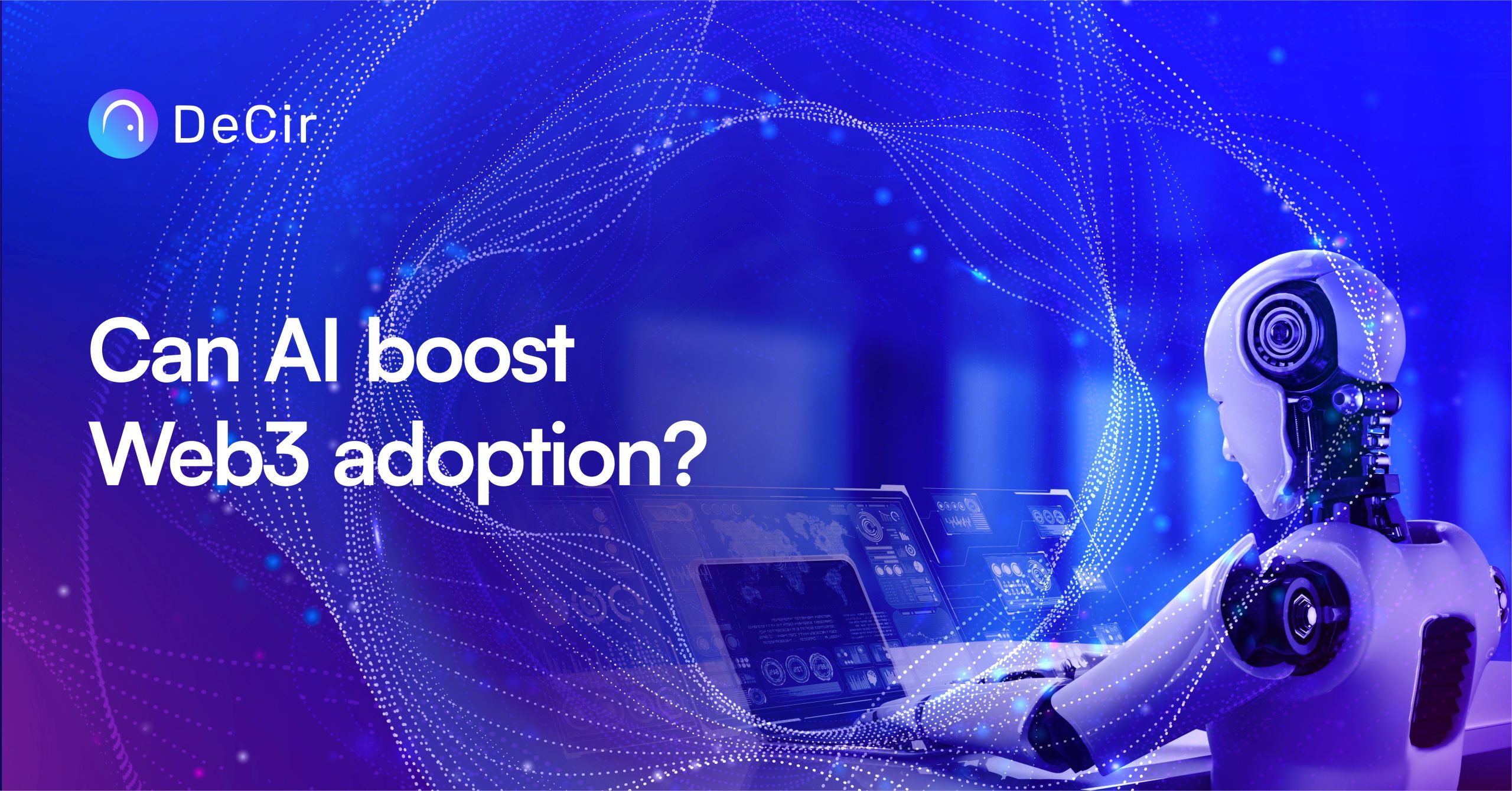Artificial Intelligence (AI) and Web3 are two of the leading technologies of the modern era. The amalgamation of these trends presents a captivating possibility – can AI boost Web3 adoption? This article delves into the promising alliance of AI and Web3, highlighting their symbiotic relationship, potential advantages, and the complexities they might encounter along the way.
TL;DR
- AI can amplify the adoption of Web3 technology by enhancing scalability, personalizing user experiences, and empowering smart contracts for dynamic execution.
- Some of the advantages of AI integration with web3 include accelerated user onboarding, proactive security measures, and AI-powered market predictions. Nonetheless, there are potential hurdles such as data privacy concerns and the need for inclusive accessibility.
- The combination of AI and Web3 holds immense potential to reshape the digital landscape, offering optimized experiences and automation. While challenges like ethics and fairness need addressing, this partnership could drive a revolutionary shift in technology.
Can AI Boost Web3 Adoption?
The rapid progress of Web3 technology, marked by the utilization of decentralized applications (dApps), blockchain, and smart contracts, has laid a solid foundation for the digital future. However, the journey toward widespread adoption faces challenges related to scalability, user experience, and accessibility. This is where AI steps in as a catalyst for transformation.
The Synergy Between AI and Web3
Enhancing Scalability with AI-Powered Solutions
Scalability remains a critical concern for Web3 platforms, hindering their ability to accommodate a larger user base without compromising performance. AI-driven solutions can optimize resource allocation, predict network congestion, and dynamically adjust parameters to enhance scalability.
Personalizing User Experience through AI
AI can transform the user experience within Web3 ecosystems. By analyzing user behavior and preferences, AI algorithms can recommend tailored dApps, streamline navigation, and provide real-time insights, making the Web3 experience intuitive and engaging.
Smart Contracts and AI
Integrating AI with smart contracts unlocks new dimensions of automation and intelligence. AI can facilitate dynamic contract execution, trigger responses based on real-world events, and enhance the accuracy of decision-making within decentralized applications.
Also read: What are bitcoin Ordinals?
Advantages of AI-Web3 Integration
Enhancing User Experience through AI-Powered Applications
User experience lies at the heart of successful technology adoption. AI has the remarkable ability to analyze user behavior, understand preferences, and predict trends. By integrating AI algorithms into Web3 applications, developers can create personalized, seamless, and engaging experiences for users.
Unlocking the Potential of Decentralized Finance (DeFi)
DeFi has been a cornerstone of the Web3 ecosystem, offering decentralized alternatives to traditional financial services. AI can play a pivotal role in optimizing DeFi platforms. From yield prediction to risk assessment, AI-powered algorithms can provide users with valuable insights, enabling informed decision-making.
Smarter Data Management and Security
Web3 is built upon the foundation of decentralization, ensuring greater security and transparency. However, as data proliferates across the network, effective management and security become paramount. AI can step in to provide sophisticated solutions.
AI-Driven Data Analytics for Web3 Networks
Analyzing vast amounts of data generated within Web3 networks can be a daunting task. AI can streamline this process by identifying patterns, trends, and potential anomalies. This not only enhances network security but also aids in optimizing network performance.
Personalized Content and Recommendations
Tailoring content to individual preferences is a hallmark of Web3. By leveraging AI, this personalization can reach new heights.
AI-Enhanced Content Curation
In a decentralized content ecosystem, discovering relevant information can be challenging. AI algorithms can curate content based on user interests, ensuring that individuals are exposed to content that resonates with them, thus fostering a deeper connection to the Web3 space.
Predictive Insights for Market Trends
For the sustained growth of Web3, it’s essential to anticipate market trends. AI’s predictive capabilities can play a pivotal role in this aspect.
Anticipating Crypto Market Trends
Cryptocurrency markets are notorious for their volatility. AI-driven predictive models can analyze historical data, market sentiment, and external factors to offer insights into potential market movements. This empowers investors to make well-informed decisions.
Accelerated Onboarding of New Users
The marriage of AI and Web3 can simplify the onboarding process for new users. AI-powered tutorials and guides can provide step-by-step assistance, enabling users to grasp the intricacies of decentralized platforms more swiftly.
Interesting piece: How Eminem Inspires Creators Globally
Challenges on the Horizon
Data Privacy and Sovereignty Concerns
AI’s functionality depends on vast amounts of data, raising concerns about user privacy and data sovereignty. Striking a balance between AI-driven insights and data protection will be crucial for sustainable adoption.
Technological Barriers and Accessibility
AI-Web3 integration might create a technological divide, with users who lack exposure to advanced technology being left behind. Ensuring accessibility through user-friendly interfaces and educational initiatives will be imperative.
Ethical Implications and Bias
AI algorithms can inadvertently perpetuate biases present in the data they are trained on. Integrating AI into Web3 platforms demands rigorous ethical considerations to prevent discrimination and ensure fairness.
Conclusion
The intersection of AI and Web3 is a fascinating crossroads of innovation. The potential benefits they offer, from scalability enhancements to personalized user experiences, are promising. However, as with any technological evolution, challenges related to ethics, accessibility, and privacy must be proactively addressed. As these two dynamic trends continue to evolve, the harmony between AI and Web3 could indeed reshape the digital landscape.


